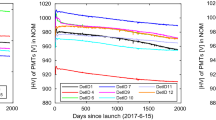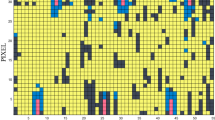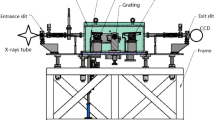Abstract
Purpose
The Hard X-ray Modulation Telescope is China’s first X-ray astronomy satellite launched on June 15, 2017, dubbed Insight-HXMT. Active and passive thermal control measures are employed to keep devices at suitable temperatures. In this paper, we analyzed the on-orbit thermal monitoring data of the first 5 years and investigated the effect of thermal deformation on the point spread function (PSF) of the telescopes.
Methods
We examined the data of the on-orbit temperatures measured using 157 thermistors placed on the collimators, detectors and their support structures and compared the results with the thermal control requirements. The thermal deformation was evaluated by the relative orientation of the two star sensors installed on the main support structure. Its effect was estimated with evolution of the PSF obtained with calibration scanning observations of the Crab nebula.
Conclusion
The on-orbit temperatures met the thermal control requirements thus far, and the effect of thermal deformation on the PSF was negligible after the on-orbit pointing calibration.





























Similar content being viewed by others
Notes
The eight periods were: 2017-06-15 T22:10:43 to 2017-06-16 T21:48:54, 2017-06-17 T20:57:20 to 2017-06-18 T17:38:04, 2017-07-05 T23:43:24 to 2017-07-08 T01:08:48, 2017-07-10 T00:45:34 to 2017-07-11 T00:43:36, 2017-07-14 T00:11:45 to 2017-07-15 T00:10:08, 2017-09-29 T00:00:05 to 2017-09-29 T17:41:53, 2017-10-25 T02:53:16 to 2017-10-26 T01:19:48, and 2018-07-14 T00:29:20 to 2018-07-15 T02:07:53.
References
S.N. Zhang, T.P. Li, F.J. Lu et al., Overview to the hard X-ray modulation telescope (Insight-HXMT) satellite. Sci. China Phys. Mech. Astron. 63(4), 249502 (2020). https://doi.org/10.1007/s11433-019-1432-6
C.Z. Liu, Y.F. Zhang, X.F. Li et al., The high energy X-ray telescope (HE) onboard the Insight-HXMT astronomy satellite. Sci. China Phys. Mech. Astron. 63(4), 249503 (2020). https://doi.org/10.1007/s11433-019-1486-x
X.L. Cao, W.C. Jiang, B. Meng et al., The medium energy X-ray telescope (ME) onboard the Insight-HXMT astronomy satellite. Sci. China Phys. Mech. Astron. 63(4), 249504 (2020). https://doi.org/10.1007/s11433-019-1506-1
Y. Chen, W.W. Cui, W. Li et al., The low energy X-ray telescope (LE) onboard the Insight-HXMT astronomy satellite. Sci. China Phys. Mech. Astron. 63(4), 249505 (2020). https://doi.org/10.1007/s11433-019-1469-5
Y. Nang, J.Y. Liao, N. Sai et al., In-orbit calibration to the point-spread function of Insight-HXMT. J. High Energy Astrophys. 25, 39–47 (2020). https://doi.org/10.1016/j.jheap.2020.01.002
Y. Tan, X.l. Cao, W.C. Jiang et al., In-orbit performance of the medium energy X-ray telescope ME onboard the insight-HXMT satellite in the first 5 years. Radiation Detection Technology and Methods submitted (2023)
X.B. Li, Y. Chen, L.M. Song et al., In-orbit performance of LE onboard insight-HXMT in the first 5 years. Radiation Detection Technology and Methods submitted (2023)
Y.-S. Wang, Y. Chen, Y.-P. Xu et al., Thermal analysis and expected performance of the low energy instrument on board the HXMT satellite. Chin. Phys. C 34(12), 1812–1817 (2010). https://doi.org/10.1088/1674-1137/34/12/005
J.Y. Miao, Q. Zhong, Q. Zhao, X. Zhao, Spacecraft Thermal Control Technologies. Space Science and Technologies. (Springer. Singapore, 2021). https://doi.org/10.1007/978-981-15-4984-7
Acknowledgements
This work was based on the data from Insight-HXMT mission, a project funded by the China National Space Administration (CNSA) and the Chinese Academy of Sciences (CAS). We gratefully acknowledge the support from the National Program on Key Research and Development Project (Grant No. 2021YFA0718500) from the Ministry of Science and Technology of China (MOST). All authors appreciate the supports from the National Natural Science Foundation of China under Grants 12273043, U1838201, U1838202, U1938102, and U1938108. This work was partially supported by International Partnership Program of Chinese Academy of Sciences (Grant No. 113111KYSB20190020). Appreciate Zeyu Song from IHEP for meticulous translation and revision. Appreciate Yongping Li from IHEP for helping with star sensor quaternion calculation.
Author information
Authors and Affiliations
Corresponding author
Ethics declarations
Conflict of interest
On behalf of all authors, the corresponding author states that there is no conflict of interest.
Rights and permissions
Springer Nature or its licensor (e.g. a society or other partner) holds exclusive rights to this article under a publishing agreement with the author(s) or other rightsholder(s); author self-archiving of the accepted manuscript version of this article is solely governed by the terms of such publishing agreement and applicable law.
About this article
Cite this article
Zhang, AM., Zhang, YF., Liao, JY. et al. Insight-HXMT on-orbit thermal control status and thermal deformation impact analysis. Radiat Detect Technol Methods 7, 337–349 (2023). https://doi.org/10.1007/s41605-023-00409-w
Received:
Revised:
Accepted:
Published:
Issue Date:
DOI: https://doi.org/10.1007/s41605-023-00409-w




